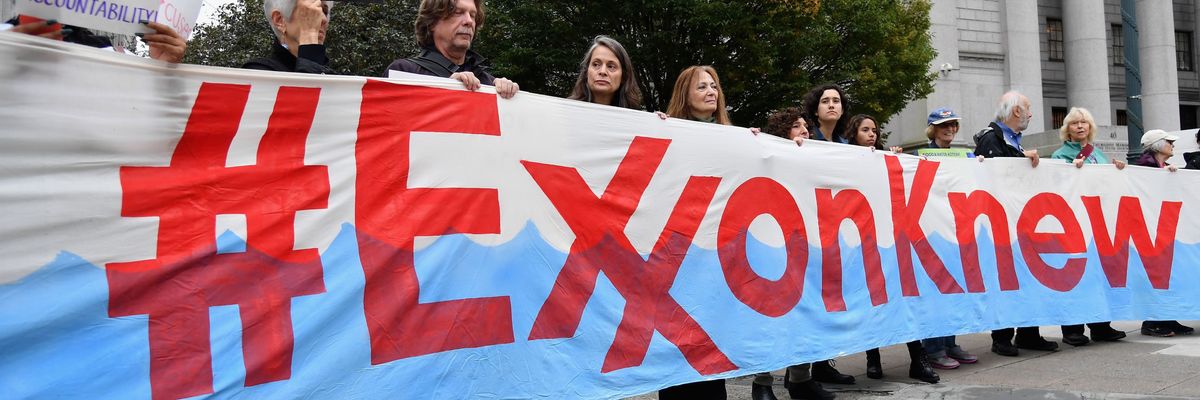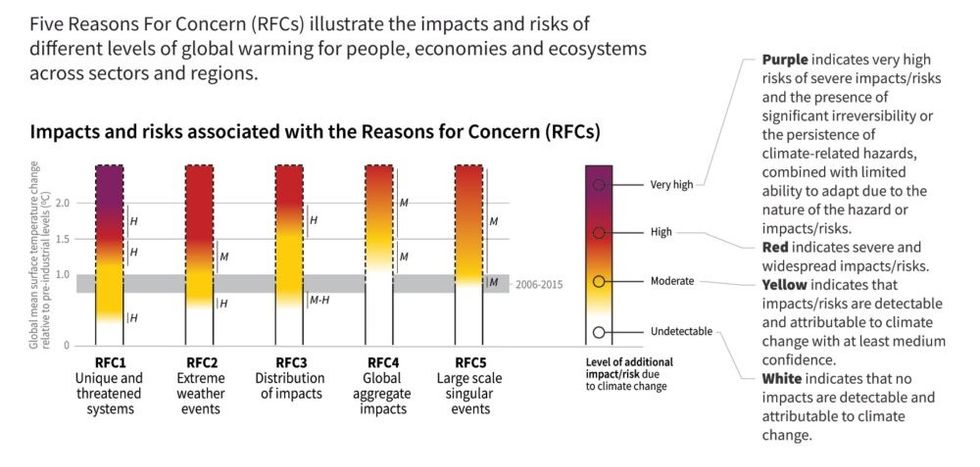There have been several dramatic advances in climate corporate accountability this month. Tens of thousands of people marched in New York City and around the world, California filed a groundbreaking lawsuit and passed new corporate climate disclosure rules, and the Wall Street Journal published new revelations about ExxonMobil’s climate disinformation efforts.
Here are the key things you need to know about California’s advances and what’s new in the internal ExxonMobil documents.
California Sues Fossil Fuel Polluters
California’s climate accountability lawsuit is groundbreaking in several ways:
- California is the first major fossil fuel-producing state to file a climate accountability lawsuit.
- California filed its lawsuit after the US Supreme Court declined requests from the fossil fuel industry to intervene in similar cases in seven states, clearing the way for cases filed as long as six years ago to proceed in state courts where they were filed. California Gov. Gavin Newsom said that fossil fuel climate accountability litigation could be a gamechanger and he’s eager to work with other governors to pursue this strategy.
- The lawsuit relies on attribution science, which marshals evidence linking such impacts as wildfires, coastal erosion, drought, and heat waves to climate change. This rapidly advancing field includes studies such as a recent one led by my Union of Concerned Scientist (UCS) colleague Kristy Dahl, which found that 19.8 million acres of burned forest land—37 percent of the total area scorched by forest fires in the western United States and southwestern Canada since 1986—can be attributed to heat-trapping emissions traced to the world’s 88 largest fossil fuel producers and cement manufacturers. (Dahl has just been named to Time magazine’s “Next 100” list of the most influential people in the world.)
- California seeks to create a fund to pay for recovery from extreme events and for mitigation and adaptation efforts (without supplanting the climate damage lawsuits filed by eight California communities against the fossil fuel industry since 2017).
- The lawsuit targets the role the American Petroleum Institute (API) has played in the fossil fuel industry’s climate deception conspiracy, building on previous complaints by the states of Delaware, Minnesota, and New Jersey; the District of Columbia; and five cities and counties. UCS’s 2015 Climate Deception Dossiers—cited in California’s complaint—highlighted an infamous 1998 internal API memo that outlined a roadmap to cultivate purportedly independent scientists as climate disinformers, confuse the public about climate science, and derail climate policies.
- The lawsuit documents and seeks to put a stop to ongoing and evolving climate disinformation campaigns by ExxonMobil, Shell, and other major oil and gas corporations. Peer-reviewed research, congressional investigations, investigative articles, and independent analyses have found that these corporations continue to depend almost entirely on fossil fuels, spend insignificantly on clean energy, and engage in greenwashing—which is making misleading or outright false claims about their corporate environmental performance.
The largest state by population, California has joined more than 40 cities, counties, and states across the United States and its territories that are suing the fossil fuel industry over climate damages or deception, or both. About one-quarter of US and US territory residents now live in a jurisdiction that has filed a fossil fuel industry accountability lawsuit.
With these innovative ingredients, California’s climate accountability lawsuit represents a pivotal development in the global climate movement, adding a powerful and long-anticipated voice to the growing chorus of jurisdictions across the United States and its territories that are holding the fossil fuel industry accountable for its role in climate damages and deception.
Internal Documents Reveal ExxonMobil’s Deception
A recent Wall Street Journal investigation of internal ExxonMobil documents sheds light on the corporation’s ongoing strategy to cast doubt on climate science—even after former Chair and CEO Rex Tillerson supposedly acknowledged the risks of climate change and the corporation claimed to stop funding groups that promote climate denial. (For an overview of the Journal investigation, check out this article in The Guardian. For more about Tillerson’s real track record on climate change, see two HuffPost columns by my colleague Elliott Negin here and here.)
The documents the Journal obtained show that in 2012, ExxonMobil sought to gather information about and exert influence over the UN Intergovernmental Panel on Climate Change (IPCC). It is not clear exactly what influence ExxonMobil had over the IPCC at that time. However, a decade later, in its sixth assessment report, the IPCC itself acknowledged that disinformation about climate science had sowed uncertainty about climate science and delayed action.
Tillerson, meanwhile, dismissed the Paris climate agreement goal of keeping global temperature increase to well below 2 degrees Celsius above preindustrial levels (and striving to limit it to 1.5 degrees C) as “something magical.” Worse still, just months before the agreement was signed, Tillerson asked, “Who is to say 2.5 is not good enough?”
Climate scientists, that’s who.
 Climate impacts and risks would become more severe if global temperature exceeds 2 degrees C above preindustrial levels. (Source: IPCC Special Report on Global Warming of 1.5° C)
Climate impacts and risks would become more severe if global temperature exceeds 2 degrees C above preindustrial levels. (Source: IPCC Special Report on Global Warming of 1.5° C)
In response to the Journal’s recent investigation, current ExxonMobil Chair and CEO Darren Woods defended Tillerson, asserting that “[n]one of these old emails and notes matter, though.” Litigation may prove him wrong. Meanwhile, Woods’ present-day leadership of the company’s woefully inadequate climate action certainly does matter. He is promoting climate plans that ignore the vast majority of ExxonMobil’s global warming emissions—the so-called Scope 3 emissions from burning its products, which account for about 85 percent of the total emissions attributable to the company. Under Woods’s leadership, ExxonMobil claims to be “
advancing climate solutions” while investing $25 billion per year through 2027 in capital expenditures, all but a fraction of it in expanding the corporation’s oil and gas business.
Woods is apparently following the playbook drafted by Exxon’s former head of corporate research in 1988: “1. Protect the value of our resources (oil, gas, coal). 2. Preserve Exxon’s business options.”
The Wall Street Journal revelations demonstrate how essential it is for internal corporate documents to be made public so the public can fully comprehend what major oil and gas companies knew about the dangers their products pose to the global climate, as well as the devastating harms that have resulted from their lies, obstruction, and delay tactics.
In July 2023, more than 20 members of Congress sent two letters to the US Department of Justice (DOJ) calling for investigation and legal action against the fossil fuel industry over climate deception. These letters reprised previous congressional calls for DOJ action in 2015 and 2016, which relied heavily on UCS research.
Strengthening Corporate Climate Disclosures
Mandatory and standardized corporate disclosures are necessary to prevent companies from employing greenwashing, paltering (using technically true statements to create an overall false impression), and data cherry-picking to misrepresent corporate actions or plans. Such disclosures also would help investors evaluate a corporation’s exposure to climate-related financial risk, which is why regulators in the European Union, United Kingdom, and Canada are beginning to demand them.
This month, the California Legislature passed two bills to strengthen corporate climate disclosures:
- SB 253 requires large public and private US-based corporations that do business in California and have annual revenues greater than $1 billion to disclose their global warming emissions—including Scope 3 emissions;
- SB 261 requires corporations, financial institutions, and insurers to report on climate-related financial risk.
UCS joined with Environment California, the Natural Resources Defense Council, and Sierra Club California to urge Gov. Newsom to sign the bills, highlighting the opportunity for California to lead the country in corporate transparency and ensure the public has the information it needs to hold companies accountable for their role in the climate crisis and mitigate further harm.
Newsom just announced that he plans to sign the legislation. As it did with its vehicle emissions standards and its 100 percent renewable energy standard, California can set the pace for national and global action.
California’s laws should also motivate the US Securities and Exchange Commission (SEC) to finalize its climate disclosure rule, which it proposed in March 2022. As my colleague Laura Peterson has explained, disclosure of Scope 3 emissions is key to understanding the big picture of a company’s climate impact. Not surprisingly, the fossil fuel industry is behind efforts to weaken the SEC rule as part of its overall attack on environmental, social and governance (ESG) investing.
Scientists: Time to Put Your Research on Record
Fossil fuel industry-driven opposition to climate action is growing fiercer as the climate accountability movement backs ExxonMobil and other major oil and gas corporations into a corner. Climate litigation is a key tool for corporate climate accountability, and science is essential to support efforts to hold fossil fuel corporations accountable for their role in the climate crisis. (That’s probably why ExxonMobil and its codefendants are so worked up about a meeting UCS and the Climate Accountability Institute convened in La Jolla, California, in 2012, to explore lessons from tobacco control that could be applied to secure accountability for climate change damages.)
California’s lawsuit, like other cases filed in the United States in recent years, depends on the physical science of climate attribution and social science research on climate disinformation. You can learn more about how to engage at the intersection of science, climate litigation and the law in the Research on the Record toolkit an upcoming webinar series offered by UCS’s Science Hub for Climate Litigation.
Besides conducting invaluable research, scientists are taking to the streets, and nearly 400 of them signed a letter to President Biden endorsing the demands of the March to End Fossil Fuels ahead of this week’s Climate Ambition Summit hosted by UN Secretary-General António Guterres, who has called for phasing out fossil fuels to avoid climate catastrophe. Now it’s time for scientists to provide their evidence in courtrooms in California, across the country, and around the world.

 Climate impacts and risks would become more severe if global temperature exceeds 2 degrees C above preindustrial levels. (Source: IPCC Special Report on Global Warming of 1.5° C)
Climate impacts and risks would become more severe if global temperature exceeds 2 degrees C above preindustrial levels. (Source: IPCC Special Report on Global Warming of 1.5° C)